Introduction to Ethics Essay: Virtue Ethics, Moral Philosophies
VerifiedAdded on 2021/04/21
|5
|1096
|92
Essay
AI Summary
This essay provides an introduction to virtue ethics, contrasting it with egoism and moral relativism. It examines the core principles of virtue ethics, which emphasizes the virtues and moral character of an individual, in contrast to deontology and consequentialism. The essay discusses how individuals acquire virtues, the relationship between virtues and real-life scenarios, and the application of virtue ethics in modern society. It also explores egoism, which focuses on self-interest, and moral relativism, which highlights the differences in moral judgments across cultures. The essay references Aristotle's views on virtue as a mean between vices and includes a case study of a selfless act by a homeless man to illustrate the practical application of virtue ethics. The paper concludes that virtue ethics is a moral characteristic that leads to a more enlightened way of life, emphasizing the importance of a good life and flourishing happiness.
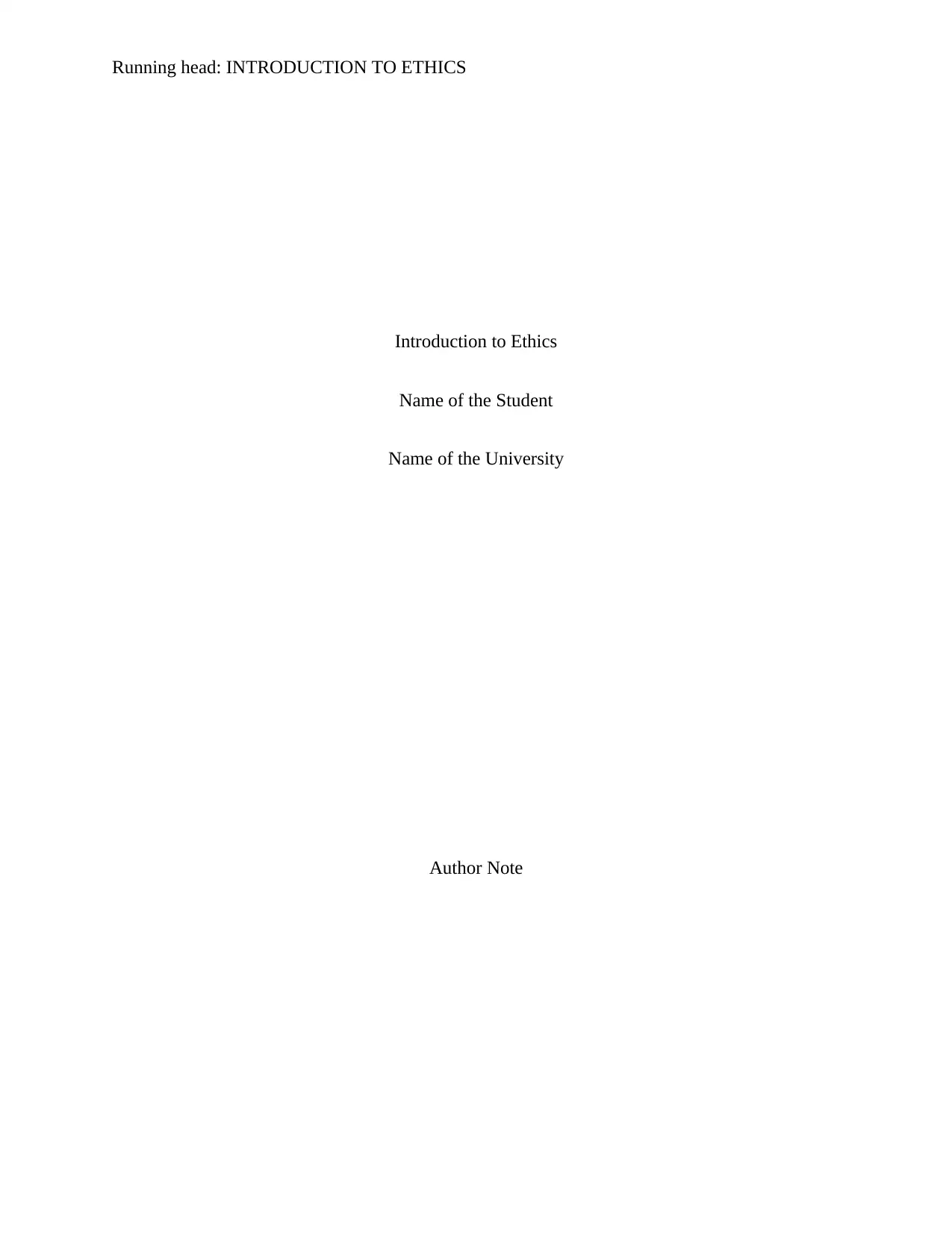
Running head: INTRODUCTION TO ETHICS
Introduction to Ethics
Name of the Student
Name of the University
Author Note
Introduction to Ethics
Name of the Student
Name of the University
Author Note
Paraphrase This Document
Need a fresh take? Get an instant paraphrase of this document with our AI Paraphraser
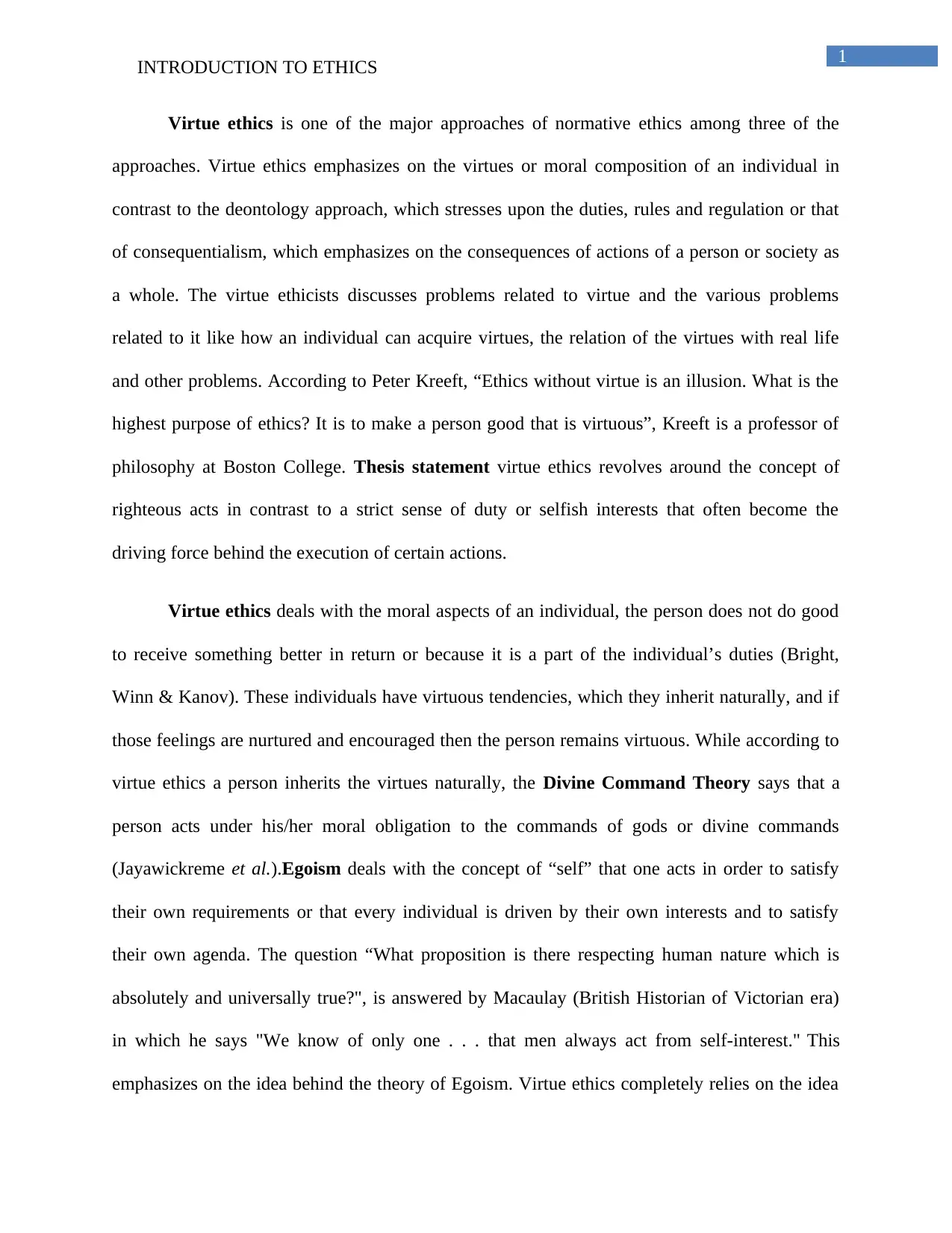
1
INTRODUCTION TO ETHICS
Virtue ethics is one of the major approaches of normative ethics among three of the
approaches. Virtue ethics emphasizes on the virtues or moral composition of an individual in
contrast to the deontology approach, which stresses upon the duties, rules and regulation or that
of consequentialism, which emphasizes on the consequences of actions of a person or society as
a whole. The virtue ethicists discusses problems related to virtue and the various problems
related to it like how an individual can acquire virtues, the relation of the virtues with real life
and other problems. According to Peter Kreeft, “Ethics without virtue is an illusion. What is the
highest purpose of ethics? It is to make a person good that is virtuous”, Kreeft is a professor of
philosophy at Boston College. Thesis statement virtue ethics revolves around the concept of
righteous acts in contrast to a strict sense of duty or selfish interests that often become the
driving force behind the execution of certain actions.
Virtue ethics deals with the moral aspects of an individual, the person does not do good
to receive something better in return or because it is a part of the individual’s duties (Bright,
Winn & Kanov). These individuals have virtuous tendencies, which they inherit naturally, and if
those feelings are nurtured and encouraged then the person remains virtuous. While according to
virtue ethics a person inherits the virtues naturally, the Divine Command Theory says that a
person acts under his/her moral obligation to the commands of gods or divine commands
(Jayawickreme et al.).Egoism deals with the concept of “self” that one acts in order to satisfy
their own requirements or that every individual is driven by their own interests and to satisfy
their own agenda. The question “What proposition is there respecting human nature which is
absolutely and universally true?", is answered by Macaulay (British Historian of Victorian era)
in which he says "We know of only one . . . that men always act from self-interest." This
emphasizes on the idea behind the theory of Egoism. Virtue ethics completely relies on the idea
INTRODUCTION TO ETHICS
Virtue ethics is one of the major approaches of normative ethics among three of the
approaches. Virtue ethics emphasizes on the virtues or moral composition of an individual in
contrast to the deontology approach, which stresses upon the duties, rules and regulation or that
of consequentialism, which emphasizes on the consequences of actions of a person or society as
a whole. The virtue ethicists discusses problems related to virtue and the various problems
related to it like how an individual can acquire virtues, the relation of the virtues with real life
and other problems. According to Peter Kreeft, “Ethics without virtue is an illusion. What is the
highest purpose of ethics? It is to make a person good that is virtuous”, Kreeft is a professor of
philosophy at Boston College. Thesis statement virtue ethics revolves around the concept of
righteous acts in contrast to a strict sense of duty or selfish interests that often become the
driving force behind the execution of certain actions.
Virtue ethics deals with the moral aspects of an individual, the person does not do good
to receive something better in return or because it is a part of the individual’s duties (Bright,
Winn & Kanov). These individuals have virtuous tendencies, which they inherit naturally, and if
those feelings are nurtured and encouraged then the person remains virtuous. While according to
virtue ethics a person inherits the virtues naturally, the Divine Command Theory says that a
person acts under his/her moral obligation to the commands of gods or divine commands
(Jayawickreme et al.).Egoism deals with the concept of “self” that one acts in order to satisfy
their own requirements or that every individual is driven by their own interests and to satisfy
their own agenda. The question “What proposition is there respecting human nature which is
absolutely and universally true?", is answered by Macaulay (British Historian of Victorian era)
in which he says "We know of only one . . . that men always act from self-interest." This
emphasizes on the idea behind the theory of Egoism. Virtue ethics completely relies on the idea
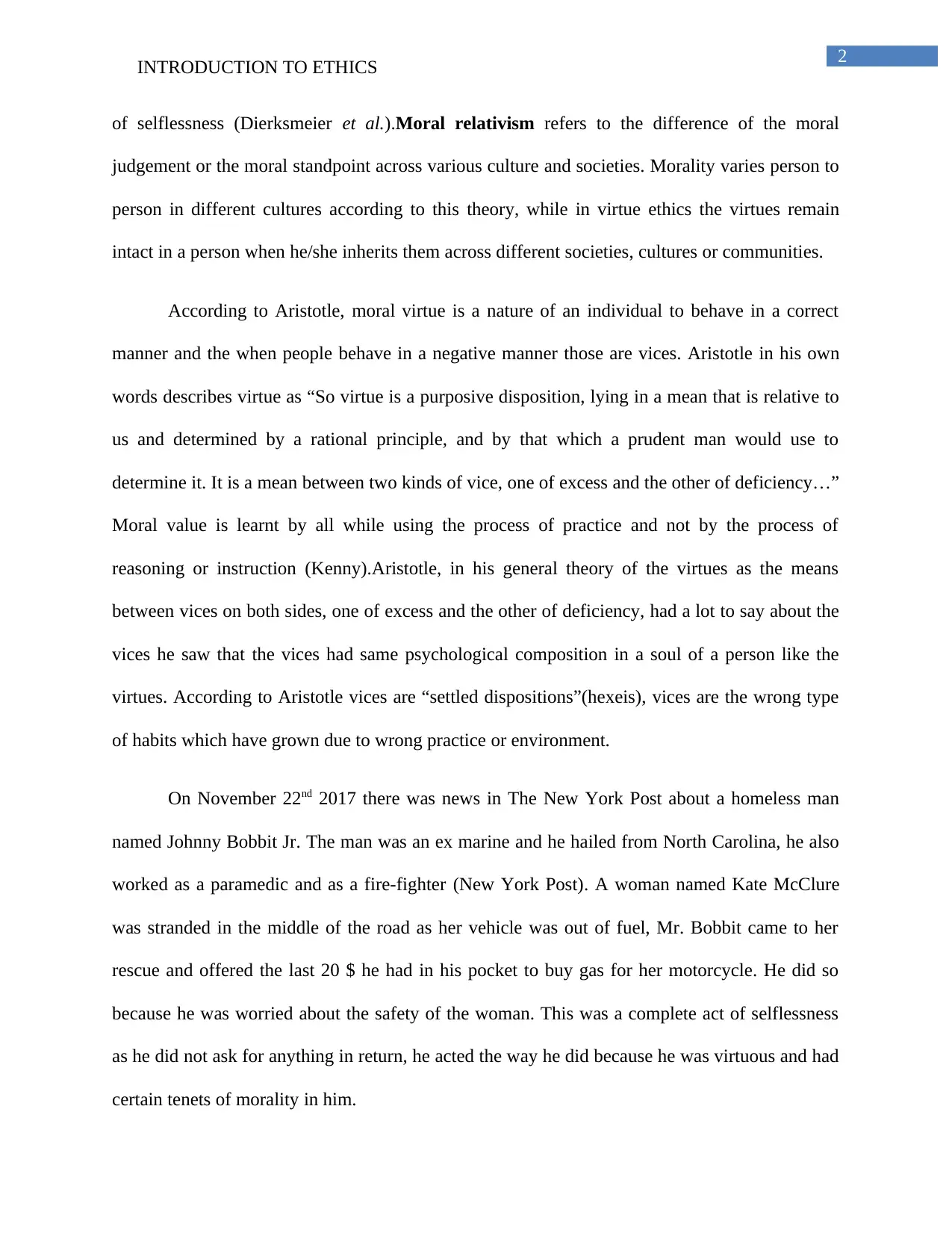
2
INTRODUCTION TO ETHICS
of selflessness (Dierksmeier et al.).Moral relativism refers to the difference of the moral
judgement or the moral standpoint across various culture and societies. Morality varies person to
person in different cultures according to this theory, while in virtue ethics the virtues remain
intact in a person when he/she inherits them across different societies, cultures or communities.
According to Aristotle, moral virtue is a nature of an individual to behave in a correct
manner and the when people behave in a negative manner those are vices. Aristotle in his own
words describes virtue as “So virtue is a purposive disposition, lying in a mean that is relative to
us and determined by a rational principle, and by that which a prudent man would use to
determine it. It is a mean between two kinds of vice, one of excess and the other of deficiency…”
Moral value is learnt by all while using the process of practice and not by the process of
reasoning or instruction (Kenny).Aristotle, in his general theory of the virtues as the means
between vices on both sides, one of excess and the other of deficiency, had a lot to say about the
vices he saw that the vices had same psychological composition in a soul of a person like the
virtues. According to Aristotle vices are “settled dispositions”(hexeis), vices are the wrong type
of habits which have grown due to wrong practice or environment.
On November 22nd 2017 there was news in The New York Post about a homeless man
named Johnny Bobbit Jr. The man was an ex marine and he hailed from North Carolina, he also
worked as a paramedic and as a fire-fighter (New York Post). A woman named Kate McClure
was stranded in the middle of the road as her vehicle was out of fuel, Mr. Bobbit came to her
rescue and offered the last 20 $ he had in his pocket to buy gas for her motorcycle. He did so
because he was worried about the safety of the woman. This was a complete act of selflessness
as he did not ask for anything in return, he acted the way he did because he was virtuous and had
certain tenets of morality in him.
INTRODUCTION TO ETHICS
of selflessness (Dierksmeier et al.).Moral relativism refers to the difference of the moral
judgement or the moral standpoint across various culture and societies. Morality varies person to
person in different cultures according to this theory, while in virtue ethics the virtues remain
intact in a person when he/she inherits them across different societies, cultures or communities.
According to Aristotle, moral virtue is a nature of an individual to behave in a correct
manner and the when people behave in a negative manner those are vices. Aristotle in his own
words describes virtue as “So virtue is a purposive disposition, lying in a mean that is relative to
us and determined by a rational principle, and by that which a prudent man would use to
determine it. It is a mean between two kinds of vice, one of excess and the other of deficiency…”
Moral value is learnt by all while using the process of practice and not by the process of
reasoning or instruction (Kenny).Aristotle, in his general theory of the virtues as the means
between vices on both sides, one of excess and the other of deficiency, had a lot to say about the
vices he saw that the vices had same psychological composition in a soul of a person like the
virtues. According to Aristotle vices are “settled dispositions”(hexeis), vices are the wrong type
of habits which have grown due to wrong practice or environment.
On November 22nd 2017 there was news in The New York Post about a homeless man
named Johnny Bobbit Jr. The man was an ex marine and he hailed from North Carolina, he also
worked as a paramedic and as a fire-fighter (New York Post). A woman named Kate McClure
was stranded in the middle of the road as her vehicle was out of fuel, Mr. Bobbit came to her
rescue and offered the last 20 $ he had in his pocket to buy gas for her motorcycle. He did so
because he was worried about the safety of the woman. This was a complete act of selflessness
as he did not ask for anything in return, he acted the way he did because he was virtuous and had
certain tenets of morality in him.
⊘ This is a preview!⊘
Do you want full access?
Subscribe today to unlock all pages.

Trusted by 1+ million students worldwide
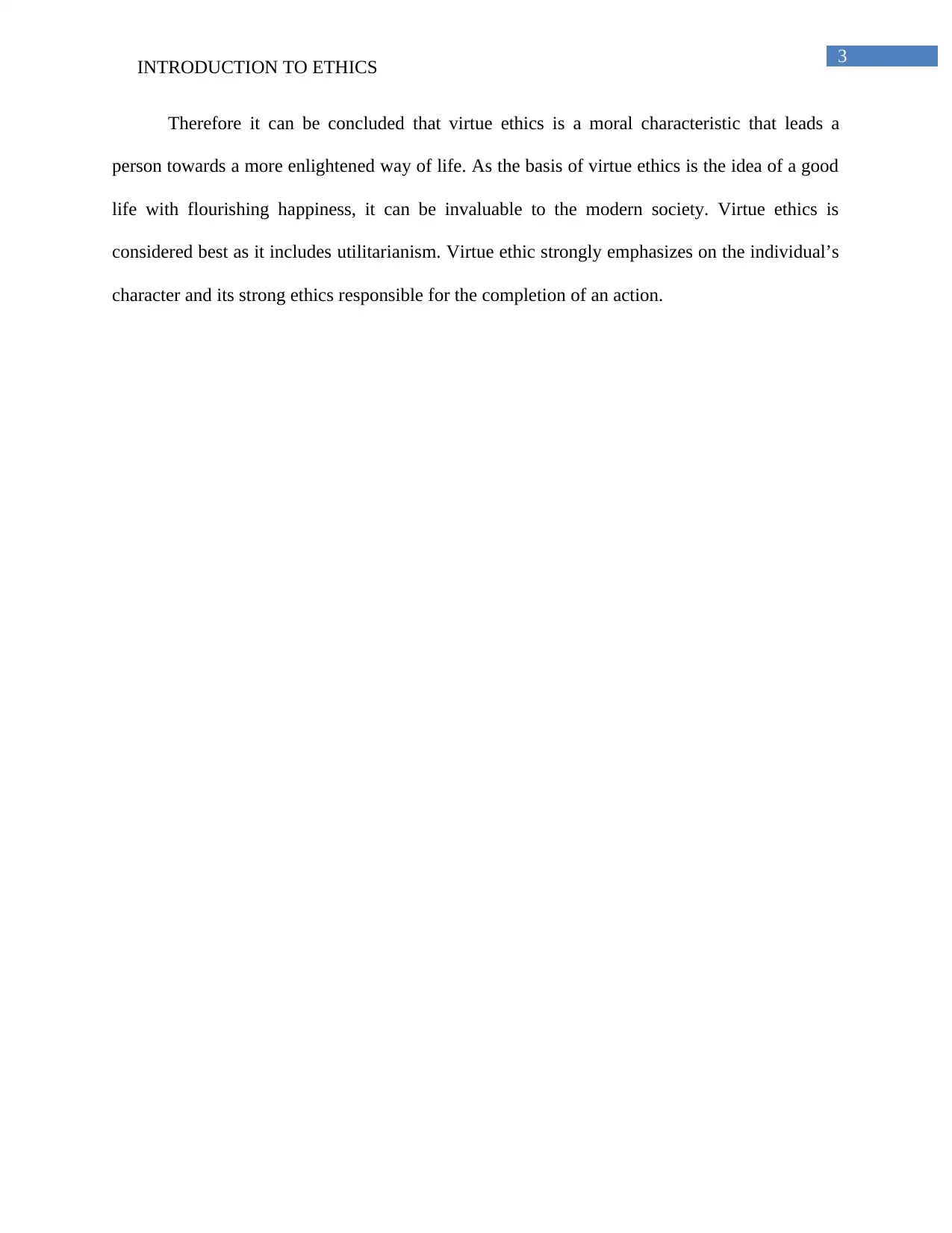
3
INTRODUCTION TO ETHICS
Therefore it can be concluded that virtue ethics is a moral characteristic that leads a
person towards a more enlightened way of life. As the basis of virtue ethics is the idea of a good
life with flourishing happiness, it can be invaluable to the modern society. Virtue ethics is
considered best as it includes utilitarianism. Virtue ethic strongly emphasizes on the individual’s
character and its strong ethics responsible for the completion of an action.
INTRODUCTION TO ETHICS
Therefore it can be concluded that virtue ethics is a moral characteristic that leads a
person towards a more enlightened way of life. As the basis of virtue ethics is the idea of a good
life with flourishing happiness, it can be invaluable to the modern society. Virtue ethics is
considered best as it includes utilitarianism. Virtue ethic strongly emphasizes on the individual’s
character and its strong ethics responsible for the completion of an action.
Paraphrase This Document
Need a fresh take? Get an instant paraphrase of this document with our AI Paraphraser
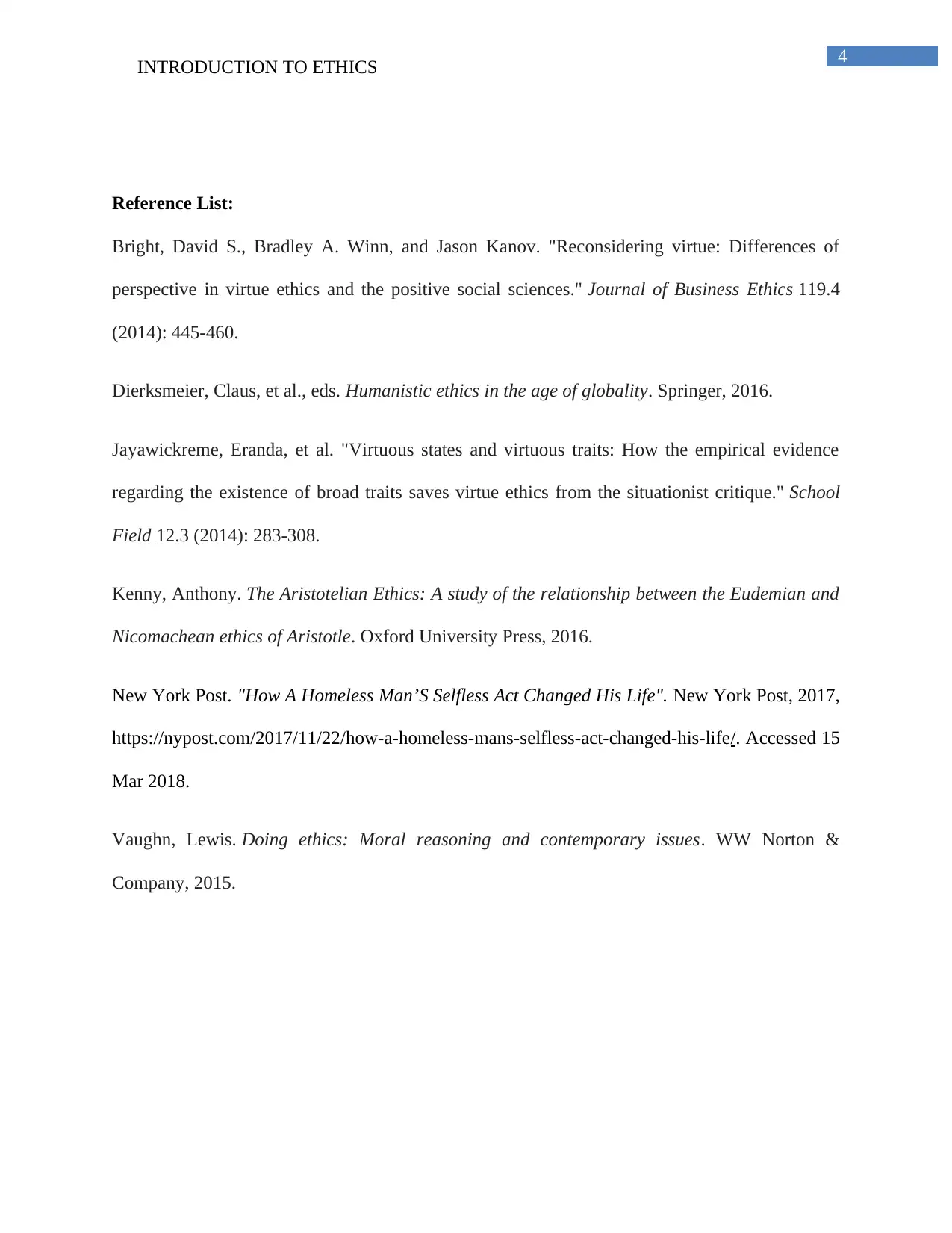
4
INTRODUCTION TO ETHICS
Reference List:
Bright, David S., Bradley A. Winn, and Jason Kanov. "Reconsidering virtue: Differences of
perspective in virtue ethics and the positive social sciences." Journal of Business Ethics 119.4
(2014): 445-460.
Dierksmeier, Claus, et al., eds. Humanistic ethics in the age of globality. Springer, 2016.
Jayawickreme, Eranda, et al. "Virtuous states and virtuous traits: How the empirical evidence
regarding the existence of broad traits saves virtue ethics from the situationist critique." School
Field 12.3 (2014): 283-308.
Kenny, Anthony. The Aristotelian Ethics: A study of the relationship between the Eudemian and
Nicomachean ethics of Aristotle. Oxford University Press, 2016.
New York Post. "How A Homeless Man’S Selfless Act Changed His Life". New York Post, 2017,
https://nypost.com/2017/11/22/how-a-homeless-mans-selfless-act-changed-his-life/. Accessed 15
Mar 2018.
Vaughn, Lewis. Doing ethics: Moral reasoning and contemporary issues. WW Norton &
Company, 2015.
INTRODUCTION TO ETHICS
Reference List:
Bright, David S., Bradley A. Winn, and Jason Kanov. "Reconsidering virtue: Differences of
perspective in virtue ethics and the positive social sciences." Journal of Business Ethics 119.4
(2014): 445-460.
Dierksmeier, Claus, et al., eds. Humanistic ethics in the age of globality. Springer, 2016.
Jayawickreme, Eranda, et al. "Virtuous states and virtuous traits: How the empirical evidence
regarding the existence of broad traits saves virtue ethics from the situationist critique." School
Field 12.3 (2014): 283-308.
Kenny, Anthony. The Aristotelian Ethics: A study of the relationship between the Eudemian and
Nicomachean ethics of Aristotle. Oxford University Press, 2016.
New York Post. "How A Homeless Man’S Selfless Act Changed His Life". New York Post, 2017,
https://nypost.com/2017/11/22/how-a-homeless-mans-selfless-act-changed-his-life/. Accessed 15
Mar 2018.
Vaughn, Lewis. Doing ethics: Moral reasoning and contemporary issues. WW Norton &
Company, 2015.
1 out of 5
Related Documents
Your All-in-One AI-Powered Toolkit for Academic Success.
+13062052269
info@desklib.com
Available 24*7 on WhatsApp / Email
![[object Object]](/_next/static/media/star-bottom.7253800d.svg)
Unlock your academic potential
Copyright © 2020–2026 A2Z Services. All Rights Reserved. Developed and managed by ZUCOL.




